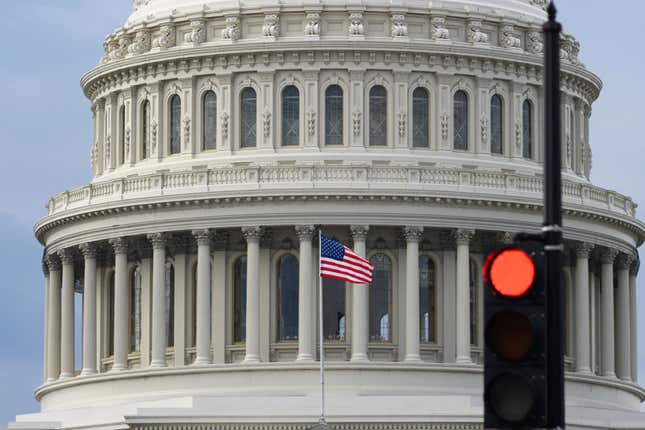
[Updated 10/14/2023 at 8:00 am E.T.]
Earlier this month, Congress narrowly avoided a catastrophic government shutdown by passing a stopgap bill. The only catch — the bill only gave lawmakers until November 17th to pass a spending bill and avoid a shutdown.
That might be less of a big deal if conservatives didn’t immediately oust House Speaker Kevin McCarthy, leaving the House without leadership and the ability to pass legislation. The primary contender to fill McCarthy’s seat was Rep. Steven Scalise (R-LA), but after a shocking KKK scandal, Scalise is out of the running.
Now, Republicans are left with Rep. Jim Jordan (R-OH), a right-wing conservative with a close relationship with Donald Trump and a penchant for attacking Black prosecutors. Alternatively, many Democrats have urged moderate Republicans to vote for Minority Leader Hakeem Jeffries, who has unanimous support from the Democratic caucus.
In the meantime, Congress is at a standstill, and a potential shutdown feels more and more likely. A government shutdown isn’t just a problem for folks on Capitol Hill. Nationwide, everyday Americans will feel the impact, and unsurprisingly, Black Americans will be particularly affected.
What Happens If The Government Shuts Down?
A government shutdown doesn’t mean all federal programs immediately stop operating. However, many critical programs like the Nutrition Program for Women, Infants, and Children (WIC) are at risk.
On Monday, Agriculture Secretary Tom Vilsack said that the WIC program — which feeds nearly 7 million children and mothers, would almost immediately stop. Millions of government employees would go temporarily without pay, and if this shutdown is anything like the last one, countless government contractors won’t receive back pay.
According to the Center for American Progress, immediately inspections of drinking water facilities and hazardous waste sites would cease, the USDA would pause loans to farmers, the FDA would have to limit food inspections, and many preschool and school readiness centers would close.
The longer the shutdown, the more vital government services are at risk as “contingency funds” for these programs begin to dwindle.
Why a Shutdown Would Hurt Black Americans
The bigger picture, particularly for Black Americans, is what happens if a government shutdown isn’t just a few days. At that point, we start seeing cuts to programs that Black Americans (because of systemic economic inequality) disproportionately rely on — such as Food Assistance, Temporary Assistance for Needy Families, and Housing Vouchers,
In the immediate aftermath of the shutdown, the White House has already warned that WIC, which as of 2018 fed an estimated 1.6 million Black mothers and babies every year, will halt services. None of this even accounts for the fact that Black Americans are somewhat overrepresented in the federal workforce, who would all be temporarily out of a job.
As Republicans continue to flounder the risk of a paralyzing shutdown inches closer and closer.

